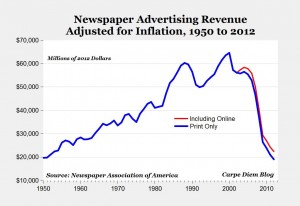Newspapers dead, film at 11
It’s been a long time since I’ve been woken up at 4 AM by a crappy car with a loud exhaust stopping at every house [0].
Or any house.
Small blessing.
Now if I could just get the LA Times to stop littering my driveway with that goddam Hoy! trash… how is that legal even after I emailed and called to get them to stop. But they kept delivering their rag (and kept billing me for it! [1]) to my house in SoPas for two years after I moved to Seattle, so I’m not holding my breath [2].
[0] The last one was a second-hand rice burner with a rattly fartcan exhaust. Thank god that’s gone.
[1] When I called to try to make them stop, their tactic was to ask me if I didn’t want to keep paying for it for the people who now lived at my old residence, or if I wanted to have it delivered to Seattle. No… just no.
[2] Or if I could get the postman to stop delivering the goddam Red Plum etc. even though I did finally get off their mail lists. But it’s not like he checks. He just dumps them until he runs out. And I’m not at the end of the line, so someone else gets the benefit of me going to the trouble of unsubscribing from that junk. That’s got to be against some kind of federal statute, giving someone else’s mail to me.
Tagged newspaper
If you want to know why newspapers are not just dying, but dead, dead, dead…
Look no further than this, which is not a headline from the Onion (ht: Atrios)
[edit] I said “newspapers”, but after listening to NPR this morning, I realized what meant was “old school media”. And yes, NPR is included in that – they have to suck up to their political, if not corporate, masters. Newspapers, radio, television, magazines (less so? – the New Yorker seems to write some hard looks at the establishment [1]); what others call the “mainstream media” (which I hesitate to use as it has become code for something else).
But the inability to ask the hard question, to make the liars uncomfortable, to jeopardize access, to educate themselves on difficult subjects, mind-boggling innumeracy, the complete failure to ask the follow-up, the hard question, “views on the shape of the earth differ” so-called objective reporting – they have made themselves obsolete. The OSM still has the cash to send reporters and cameras to far away places, but that’s about all they’ve got left. And that increasingly less, and not for long.
Good riddance.
[1] A sixties word which I think is coming back into relevance. It isn’t the corporations, it isn’t the government, it isn’t the media. It’s all of them combined, the oligarchy, all owned and operated by the same few people. The Establishment.